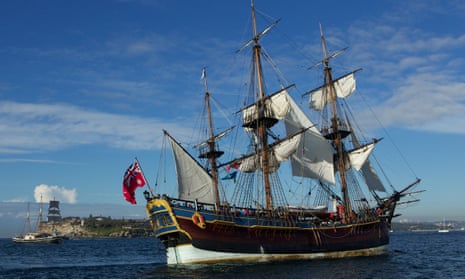A village in New Zealand has banned a replica of Captain Cook’s ship from docking there to mark 250 years since the explorer’s arrival after an outcry from the local Māori community.
The vessel is part of a flotilla circumnavigating New Zealand next month for the Tuia 250 – a NZ$13.5m (£7m) series of events that “acknowledges the first onshore encounters between Māori and Pākehā in 1769-70”. It was due to visit Mangonui, in the North Island, but the stop was cancelled by the ministry of culture and heritage after complaints from indigenous figures.
Anahera Herbert-Graves, the head of Northland’s Ngāti Kahu iwi, or tribe, told RNZ: “He [Cook] was a barbarian. Wherever he went, like most people of the time of imperial expansion, there were murders, there were abductions, there were rapes, and just a lot of bad outcomes for the indigenous people.
“He didn’t discover anything down here, and we object to Tuia 250 using euphemisms like ‘encounters’ and ‘meetings’ to disguise what were actually invasions.”
In Gisborne, nearly 800km from Mangonui down the east coast and the starting point for the flotilla’s months-long voyage, iwi said they would refuse to hold pōwhiri, or welcoming ceremonies, for those ships linked to colonisation.
Amohaere Houkamau, at the Rongowhakaata Trust said a service would be held for the “nine tīpuna [ancestors] who were shot or injured during the events of October 1769” and suggested “descendants of the colonialists” were better placed to welcome the ships.
Tamsin Evans, the ministry for culture and heritage’s deputy chief executive, said the government had heeded iwi concerns, and the flotilla would stop only at communities “where a welcome is clear”.
“We know there are groups of people that have strong feelings. Tuia 250 is a commemoration in which we can have honest conversations about our history,” she said.
Tensions have been rising for more than a year before the planned celebrations. In Gisborne, the council decided to remove a statue of Cook after it was repeatedly vandalised.
Cook and the crew of the Endeavour landed in Gisborne’s Poverty Bay in 1769 and the first significant meetings of Europeans and Māori took place nearby. The name Poverty Bay has in itself caused controversy – its original name was Tūranganui-a-Kiwa before being renamed by Cook.
In March, the Cook Islands considered changing its name to respect its indigenous heritage, with Avaiki Nui an early frontrunner. The name “must have a taste of our Christian faith, and a big say on our Māori heritage. And it must instil a sense of pride in our people, and unite our people,” Danny Mataroa, chair of the name change committee, told RNZ Pacific.
Last year, indigenous campaigner Tina Ngata criticised the upcoming events. “[Cook] was a murderer, he was an invader [and] he was a vanguard for British imperial expansion.
“If you read through his own journals and the journals of the crew members, it was not uncommon for him to shoot at us, to steal from us, for abductions to happen, and in fact whole communities were wiped out through sexually transmitted diseases.”
Herbert-Graves said the ministry had not consulted the iwi before placing Mangonui on the Tuia 250 itinerary.
Tamsin Evans, the ministry’s deputy chief executive, said talks had been with a single iwi representative at the Doubtless Bay Promotions Trust and hoped most people still wanted to take part.
“We always knew that Tuia would cause some mixed responses. We fully appreciate the mamae [hurt] that exists very strongly still in some communities. Our job is to open the books, let’s look at all the history, and let’s start to talk about this.”
On Tuesday, a traditional double-hulled sailing canoe arrived in Tauranga from Tahiti after a trip lasting nearly four weeks. Traditional navigation methods were used to guide the Fa’afaite to the North Island in honour of navigator Tupaia, who mediated between Māori communities and the crew of the Endeavour.
Bernadette Cavanagh at the culture ministry said: “The Tuia 250 national commemoration highlights the stories of Tupaia which have often been overshadowed in our history by the feats of James Cook.”
